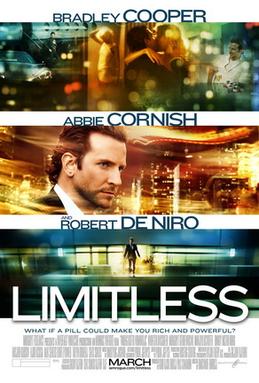Limitless
/ We all want to be smarter, faster, improvements upon ourselves, the 2.0 version of our percieved out of date opeating systems. Like the best science fiction stories, Neil Burger's 2011 film Limitless is a film that looks to the very basics of human life, and watches where people inevitably mess it up with our own flaws. Based off of a 2001 book, The Dark Fields, by Alan Glynn, the film looks at what people do if they can operate with nothing holding them back.
We all want to be smarter, faster, improvements upon ourselves, the 2.0 version of our percieved out of date opeating systems. Like the best science fiction stories, Neil Burger's 2011 film Limitless is a film that looks to the very basics of human life, and watches where people inevitably mess it up with our own flaws. Based off of a 2001 book, The Dark Fields, by Alan Glynn, the film looks at what people do if they can operate with nothing holding them back.
Eddie Morra is a struggling person. He's got a novel that he's been trying to work on, a girlfriend who's left him (not to mention an ex-wife who wasn't around for very long), and an apartment that he can barely afford. Down on his luck, he takes a pill from a dubious character (his ex-brother in law), who tells him that it's FDA approved, and that it'll be the next big thing. He takes the pill, and ceases to be a struggling person: he's focused, smarter, faster. He makes connections from things that he learned years ago, observes things that he would normally overlook, and finishes the book that he struggled to finish for so long. He's a changed man, and NZT48 is his ticket to success. Think super Ritalin that solves everyone's hangups.
However, when other people who were on the drug start to wind up in the hospital, or dead (including his ex-brother in law), things get serious. No longer content with writing, he takes up finance, having dreamt up a plan to take him to bigger and greater things, and soon, he's rolling in the cash, working with big shot financiers, and is being followed by ill-intentioned characters.
Limitless was a total surprise for me: it wasn't a film that really popped up on my radar when it was released earlier this year. It got some good reviews, and appeared in a local Redbox. It's a pleasant surprise, a film that's got a lot to say, and has the perfect intersection of good acting, fantastic camerawork and a great story.
The film was never really sold as a science fiction thriller, but its roots in the genre are clear as day: it feels very much like a modern William Gibson novel, with equal parts Pattern Recognition and Flowers for Algernon. Moreover, the film shows us that with great intelligence or skill, we're still at the mercy of our own, human faults. Eddie gets smarter, but as he does so, he gets paranoid, overconfident, inflicted with hubris.
The film makes a good point about overreaching, one that's highly relevant in this day and age. The connections to the financial markets is likely no accident: if ever there was a time when fiction points to the flaws in modern day society, the financial meltdown of 2008 is a good example. There's a perfect connection between the abstract news and times elements here and that of a character doing the same exact thing. Here, the movie succeeds brilliantly.
Coupled with the story is Burger's fantastic approach to the film. Rarely does a film come along where the medium and everything that goes with it helps to support the story. Slacker-Eddie sees the world through grays and drab colors. Super-Eddie sees everything in vibrant shades. There's a series of great, endless zoom shots that go along with this, a limitless, never ending perspective that helps us see the world through Eddie's eyes.
The third big part of the film rests with Bradley Cooper, who played Eddie. I've been a fan of him since his short stint in Alias a while back, and while he's never really done a lot that I've seen - mostly comedies - Limitless demonstrates that he really can carry a picture along nicely. Even where I'm usually annoyed by voice overs or excessive narration, he makes it work quite well. For the most part, he's the star of the show, but I have to say that he's overshadowed a bit by Andrew Howard, who played Gennady, the loan shark who Eddie inadvertantly advances. He utters some of the best lines of the movie, and while it's a little uneven at first, his presence grows nicely.
If there's any fault with the picture, it's that it's almost overreaching itself: small bits of the film are never quite compounded on: Eddie's ex-wife, who provides a vital piece of information before vanishing; Eddie's novel, which appears and vanishes without a trace by the end of the film; little things that could have been snipped and woven into the film to help reinforce parts of the plot and story. The film isn't wanting for more material, but the extra pieces feel like they're almost added on, and turn what could have been an elegant story into something even better. As it stands, it wanders a little bit, hitting good pieces, but pieces that feel somewhat disconnected. Still, it's far better than what most of Hollywood churns out.
Limitless works well for what it is: it's easily one of the best science fiction films of 2011, in the same line of films as Source Code (and from appearances, In Time, coming out later this year.) It's slick, relevant, but above all, never strays too far from the main focus of the story: the central character, and all of his flaws.
